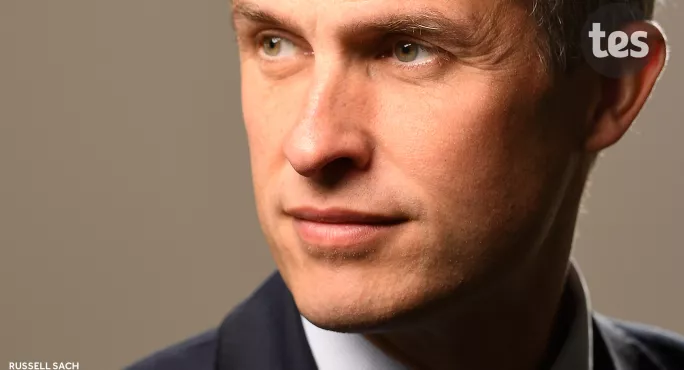
- Home
- ‘Weird and wonderful’: why Williamson’s speech matters
‘Weird and wonderful’: why Williamson’s speech matters

Let’s start with the obvious. The focal point of education secretary Gavin Williamson’s speech to the Conservative Party conference was, without question, further education. In front of a hall of party stalwarts who looked like they might struggle to recognise a college if they walked into one, Williamson valiantly expounded his vision of a “supercharged” further education sector. One that would, he vowed, be better than Germany (come on, everyone has to toss a little red meat to the Tory faithful) by 2029, according to an unspecified metric.
Bravo, sir. A cynic might suggest that, having had the remit of the government’s non-existent skills minister pushed on to him out of necessity, Williamson had little choice but to bang the drum for the sector (especially as a former college student himself).
But this belies the fact that his speech revealed more than the education secretary may have realised. Having ruminated on its content, I’ve come to the conclusion that the subtext behind it was, in equal parts, weird and wonderful.
The weird
“Governments of all colours,” Williamson told the auditorium at Manchester Central, “have talked about technical and vocational education”. But, he continued, “deeds, in truth, have rarely matched the words”.
“That’s why I promise to give my all to make technical and vocational education the first choice for anybody with the aptitude, desire and interest to pursue it. Apprenticeships, technical and vocational education are just as valuable as university education and they are just as important to our economy.”
While the words coming out of Williamson’s mouth would be music to the ears of anyone who believes in the transformative power of further education, I was left feeling uneasy. It took me a while to figure out the reason why: this is what we want education secretaries to say, what we have been dreaming of for years, not what they actually say at the Conservative Party conference, for goodness’ sake.
This is a feeling I’ve had before this year already: when Theresa May spoke at the launch of the Augar review. May’s period as prime minister may feel like a distant memory, but hearing the country’s leader pledging to “boost further education spending and put right the errors of the past” at precisely the point where she did not have the power to do anything about it was as galling as it was exhilarating, as I wrote at the time.
The wonderful
If anything, the power of the current government is even more precarious than that of May. So to hear a flagship set-piece speech at the Conservative Party conference expounding the same theme as May inevitably triggered the same bittersweet mixture of emotions.
But, on reflection, I’m left feeling more hopeful. Fears that the pro-FE sentiments of Augar would evaporate as swiftly as they emerged have, thankfully, proved not to be the case. The injection of £400 million in funding into FE to raise the 16-18 funding rate for the first time since 2010 was a small but welcome first step. And the fact that the latest education secretary has placed the sector front and centre of his speech shows that the way FE is perceived is undoubtedly changing. And its waxing fortunes do not appear to be dependent on those of one political party: Labour and the Lib Dems have also been at pains to stress its importance through their own party conferences. And several well-placed sources all point to the fact that civil servants beavering away behind the scenes across the Department for Education, the Treasury and even No 10 are in no doubt that FE will continue to be a key area of focus from now on.
And there was one final reason for optimism in Williamson’s speech. It was a blink-and-you’ll-miss-it throwaway phrase. But it was one that spoke volumes: “But I don’t want to focus only on apprenticeships and T levels, because we need better technical and vocational education over and above that, too.”
Hang on a minute. A minister is acknowledging the importance of something other than T levels and apprenticeships? This sentence may have led into a section of the speech on institutes of technology – an already-established (if limited in scope) Conservative policy. But as a clear move away from the blinkered twin policy obsession that has dominated a succession of ministers in the Department for Education, it felt significant. Whether it will lead to a reprieve for the at-risk BTECs and applied generals, for instance, remains to be seen. But as a recognition of the importance of FE in all its broad, diverse and complex glory, it was arguably the most pertinent sentence that Williamson uttered.
After a decade of systematic underfunding of FE, a degree of cynicism that lasting change will emerge from this period of extreme political uncertainty is only natural. But the weird and wonderful spectacle that unfolded at the Conservative Party conference suggests that there are signs that the FE sector’s stock will continue to rise.
Register with Tes and you can read five free articles every month, plus you'll have access to our range of award-winning newsletters.
Keep reading for just £4.90 per month
You've reached your limit of free articles this month. Subscribe for £4.90 per month for three months and get:
- Unlimited access to all Tes magazine content
- Exclusive subscriber-only stories
- Award-winning email newsletters
You've reached your limit of free articles this month. Subscribe for £4.90 per month for three months and get:
- Unlimited access to all Tes magazine content
- Exclusive subscriber-only stories
- Award-winning email newsletters



